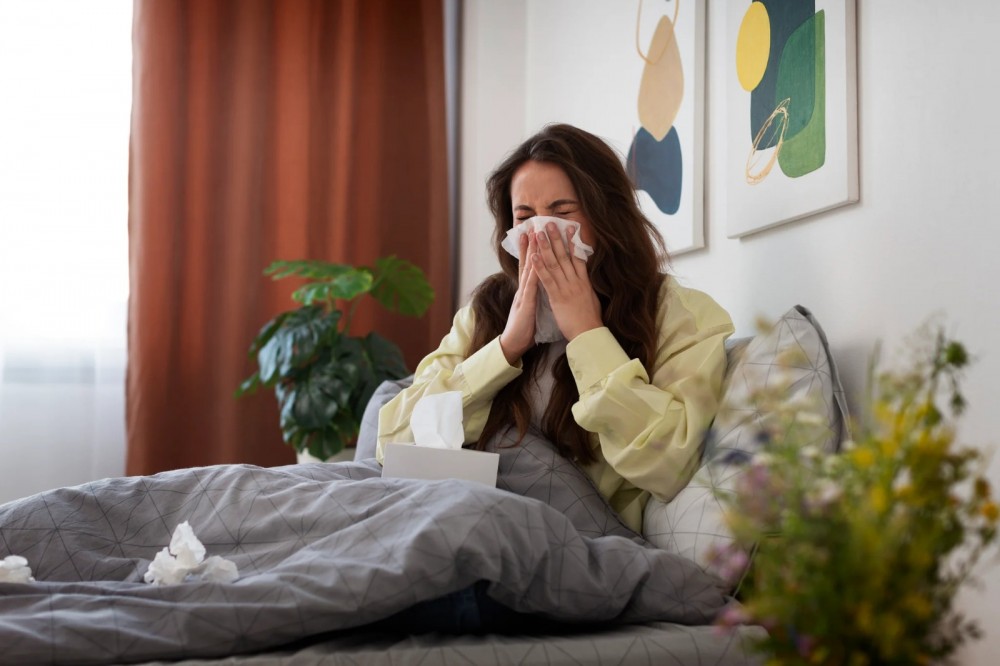-
SALES
- Popular BrandsCetaphilColgateDettolDoveEgo QVGuardianGilletteKloranceKotexKundalMore ...

- Health Supplement
- Popular BrandsCetaphilColgateDettolDoveEgo QVGuardianGilletteKloranceKotexKundalMore ...
Healthy Food ProductsNew- Popular BrandsCetaphilColgateDettolDoveEgo QVGuardianGilletteKloranceKotexKundalMore ...
- Mom & Baby
- Kids
- Personal Care
- Popular BrandsCetaphilColgateDettolDoveEgo QVGuardianGilletteKloranceKotexKundalMore ...
- Skincare
-
Popular BrandsCetaphilColgateDettolDoveEgo QVGuardianGilletteKloranceKotexKundalMore ...
- First Aid
- OTC Medicine
- Popular BrandsCetaphilColgateDettolDoveEgo QVGuardianGilletteKloranceKotexKundalMore ...
- Rehab
- Popular BrandsCetaphilColgateDettolDoveEgo QVGuardianGilletteKloranceKotexKundalMore ...
- All Products
Allergic Rhinitis

What is Allergic Rhinitis?
Allergic rhinitis/hay fever is the inflammation of the nose caused by allergens.
The allergic response occurs in two phases, “early” and “late” phase responses. Early phase occurs within minutes of exposure to the allergen and tends to produce sneezing, itching, and clear rhinorrhea while late phase occurs 4-8 hours after allergen exposure and is characterized by congestion, fatigue, malaise and irritability.
There are approximately 10-30% of adults and 40% of children worldwide affected by allergic rhinitis.
Types of Allergic Rhinitis
- Seasonal (due to pollen during spring)
- Perennial (due to indoor substances like dust mites & pet dander)
Common risk factors
- Having atopic dermatitis/asthma
- Exposure to dust mites, animal dander, pollens
- Air pollution
- Tobacco smoking
- Perfumes
Sign & Symptoms
- Red, itchy, watery eyes
- Sneezing, congestion, runny nose
- Sore throat
- Fatigue
Complications:
- Sleep disturbance
- Development/worsening of asthma
- Ear inflammation
- Nasal polyps (fleshy swelling in nose)
- Allergic conjunctivitis
Food to Focus
- Vegetables (bell peppers, brussels sprouts, cabbage, broccoli)
- Fatty fish (salmon, sardines, mackerel)
- Stingling nettles
Food to Avoid
- Dairy
- Bread
Lifestyle Modifications
- Keep your home dry & well-ventilated
- Limit number of pets at home
- Avoid allergens
- Avoid using aerosols in areas where children sleep/play
References
1.NHS choices. NHS; [cited 2022Jan4]. Available from: https://www.nhs.uk/conditions/allergic-rhinitis/
2.What is the global prevalence of allergic rhinitis (hay fever)? [Internet]. Latest Medical News, Clinical Trials, Guidelines - Today on Medscape. 2019 [cited 2022Jan4]. Available from: https://www.medscape.com/answers/134825-4371/what-is-the-global-prevalence-of-allergic-rhinitis-hay-fever
3.Hay fever (rhinitis) | symptoms & treatment | ACAAI public ... [Internet]. [cited 2022Jan4]. Available from: https://thefactorylb.com/news-https-acaai.org/allergies/allergic-conditions/hay-fever/
4.Hafner J. The best (and Worst) Foods to help fight your allergies [Internet]. USA Today. Gannett Satellite Information Network; 2017 [cited 2022Jan4]. Available from: https://www.usatoday.com/story/news/nation-now/2017/03/15/best-and-worst-foods-help-fight-your-allergies/98979394/
Let's keep in touch
Subscribe for our latest news and be the first to know about our offers.


